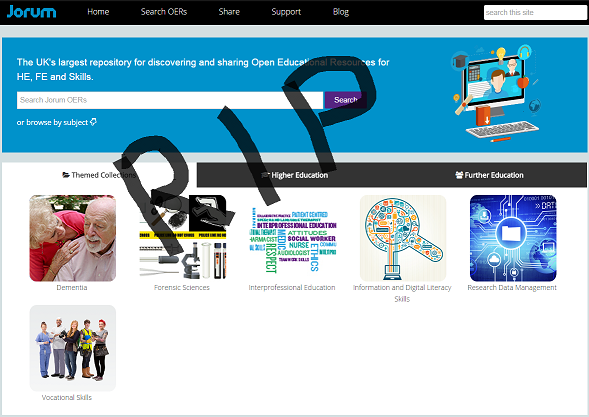I don’t remember Kennedy being assassinated in 1963 on account of not having been born but when Princess Diana was killed in on August 31st in 1997 I was living in a bedsit in North London.
Well there was another dramatic JFK moment on Wednesday June 24th 2015 when Jorum, the national OER repository, was retired. At least if you were working in educational technology. I was presenting at an OER workshop organised by CILIP when the news broke, where all the speakers were referencing Jorum as central to their practice. That particular event was on “Using free, shared, information literacy resources” and a significant Jorum initiative had been to curate themed collections of resources including ‘Information and Digital Literacy Skills’ and ‘Research Data Management’.
In theory OERs from Jorum are available from Jisc’s new app and resource store (currently in beta). Currently a search for “RDM” allegedly returns 17 results but I can only see two of these (perhaps a temporary beta issue?) An archived snapshot of Jorum is also available from the Wayback Machine but as far as I can tell most of the browse or search functionality doesn’t work and resources can’t be downloaded.
In any case I was pleased to discover that a large number of RDM resources, including but not only those from Jorum, have been archived by Laura Molloy in Zenodo – https://zenodo.org/communities/dcc-rdm-training-materials/?page=1&size=20
Of course OER lives on after Jorum, in its own right and as part of broader open scholarship, and I’m very interested in some of the commonalities between OER and RDM both in the technical context of repositories – complex and esoteric file types, potentially interactive content – and in terms of educational potential. In the context of research led teaching, are openly licensed research data de facto OER?

